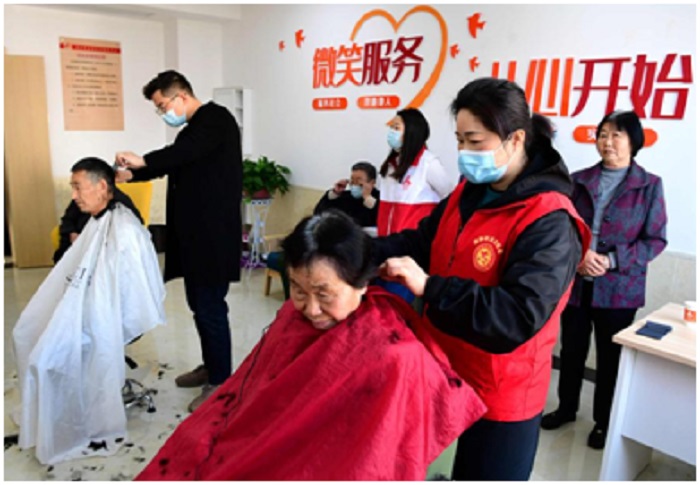



“Such great elderly care services were never imaginable in the past,” said Pan Jihong, 69, from Chaoyang District of Beijing.
Pan’s husband has mobility problems and needs long-term medication as a patient of multiple geriatric diseases. “Every month I’d take him to three different hospitals to fetch four kinds of medicines,” Pan said, adding that the scheduling was really annoying.
According to her, every time she and her husband went to a hospital, they had to spend a whole day there waiting in lines for registration, diagnosis, and payment, which was exhausting for both of them.
Thanks to a community-based elderly care program jointly launched in February by the community where Pan lives and the Hogo Living Technology Group, a tech service firm in Beijing, Pan’s troubles were eliminated.
Under the program, the property management department of the community matched Pan’s husband to an online hospital that offer online prescription extension and drug delivery services. Part of the expense is covered by the medical insurance.
According to an employee of the Hogo Living Technology Group, community-based elderly care offers daycare, nursing, housekeeping and consolation services, relying on the community organization and professional nursing companies.
It provides stay-at-home senior citizens, who were cared by their families, with more quality services, and compared with nursing homes, community-based elderly care is more convenient as the seniors can enjoy services at home.
Today, young couples are always facing difficulties when supporting their parents, as they shoulder pressure from both work and life. Nursing homes to some extent alleviate the situation, but they are not able to satisfy diverse and individualized demands. Under such background, community-based elderly care marks another active exploration into senior care issues.
The aspiration of the seniors for high-quality life never fades as they age. Therefore, community-based elderly care must ensure the life quality of senior citizens, both on material level and cultural and ethical level.
“What helped me the most is the training course on the how-tos of smart phones. The teachers were patient and taught us how to operate smart phones. I really admired those who could pay can call taxis with their phones, and now I can also do those things with just a phone,” said Hu Wenping, who lives in Huangying Kangqiao Huaju community, Rencheng District, Jining of east China’s Shandong Province.
According to him, every week the community held activities to serve senior citizens, for instance smart phone training courses, handicraft workshops, and health lectures. He said he was also satisfied with the elderly-oriented renovation in the community.


The Executive and members of the.


The Acting Director, FCT Directorate of.


President Bola Ahmed Tinubu has been.



Barely a month after resignation of.


An Abuja based Legal Practitioner, Osuagwu.



Convener of Equitable Remedy, Mrs. Magaret.


Contractors handling the contract for city.


Nigerian government may have concluded plans.


The Diplomatic Correspondents Association of Nigeria.


A rights group, “Follow Me Talk.
Leave a Comment